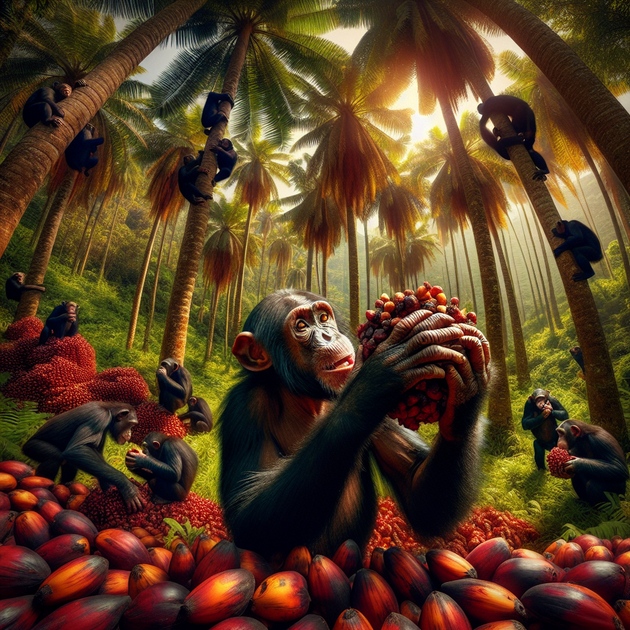Have you ever imagined a group of wild chimpanzees unwinding at happy hour? As strange as it sounds, recent research shows that these clever primates are basically sipping on the natural equivalent of two cocktails every day—all thanks to some very boozy fruit.
How Do Wild Chimpanzees End Up Drinking Boozy Fruit?
You might be wondering—are these chimps actually seeking out alcohol? Well, not exactly in the way humans do. But researchers studying wild chimpanzee behavior in West Africa found that these animals often feast on overripe palm fruits. These fruits naturally ferment on the forest floor or right on the tree. The fermentation process turns sugars into alcohol (ethanol), giving the fruit a punchy kick.
When scientists measured how much fermented fruit these chimps ate and calculated the alcohol content inside, they realized something surprising—the chimps were regularly getting enough ethanol to equal about two human-sized cocktails per day!
Why Are Chimps Consuming So Much Alcohol?
So why would wild chimpanzees munch away at boozy fruit? There are a few possible reasons:
- Food Availability: In certain seasons or areas, ripe or overripe (fermented) fruits might be some of the easiest foods to find.
- Calorie Boost: Fermented fruits have more accessible sugars and calories but might also be easier to digest.
- No Bad Effects: Chimps don’t seem to get drunk or show hangover symptoms—they appear perfectly healthy after eating this fruity “cocktail.”
- Enjoyment? It’s possible chimps prefer the taste or smell of slightly fermented fruits.
And here’s another twist—scientists think this habit could explain why humans (and other primates) have genes that help us break down alcohol efficiently. Our distant ancestors might’ve faced similar food choices!
An Up-Close Anecdote From The Field
One field researcher described watching a group of wild chimpanzees settle around a palm tree dripping with heavy clusters of dark red fruits. The air was thick with a sweet-sour scent—the unmistakable aroma of fermenting sugar. As soon as the first chimp cracked open a fruit and started munching, others rushed in for their share. Despite eating dozens each, none seemed tipsy; they just chattered and groomed each other like any other afternoon.
The scientist said it felt almost like witnessing an impromptu cocktail party—except everyone was furry and much more interested in climbing trees than making small talk!
What Does This Mean For Chimpanzee Health And Behavior?
Now you might be wondering if all this natural “drinking” is good or bad for wild chimpanzees. Surprisingly, researchers haven’t found any negative health effects from their boozy snacking habits. Chimps don’t seem intoxicated or impaired—they go about their usual routines without missing a beat.
This discovery also offers new clues about human evolution:
- Tolerance Genes: Both humans and chimps have gene variations for breaking down alcohol safely—a helpful trait if your food sometimes ferments!
- Cultural Roots: Our own history with alcohol may have started long before ancient brewing—possibly millions of years ago with ancestors who loved ripe fruit as much as modern chimps do.
It’s also led scientists to wonder what else we can learn by studying our closest animal relatives’ eating habits.
The Big Picture—And A Curious Question For You
So, while you probably won’t see a chimp ordering a martini anytime soon, it turns out that wild chimpanzees do regularly “drink” thanks to naturally fermented fruit in their environment. And they handle it just fine! This quirky habit helps us understand both animal diets and our own evolutionary quirks.
Next time you see an overripe banana sitting on your counter, remember—it’s not just humans who enjoy a little fermentation now and then.
What other surprising habits do you think animals have that we’re only just starting to discover?

Leave a Reply